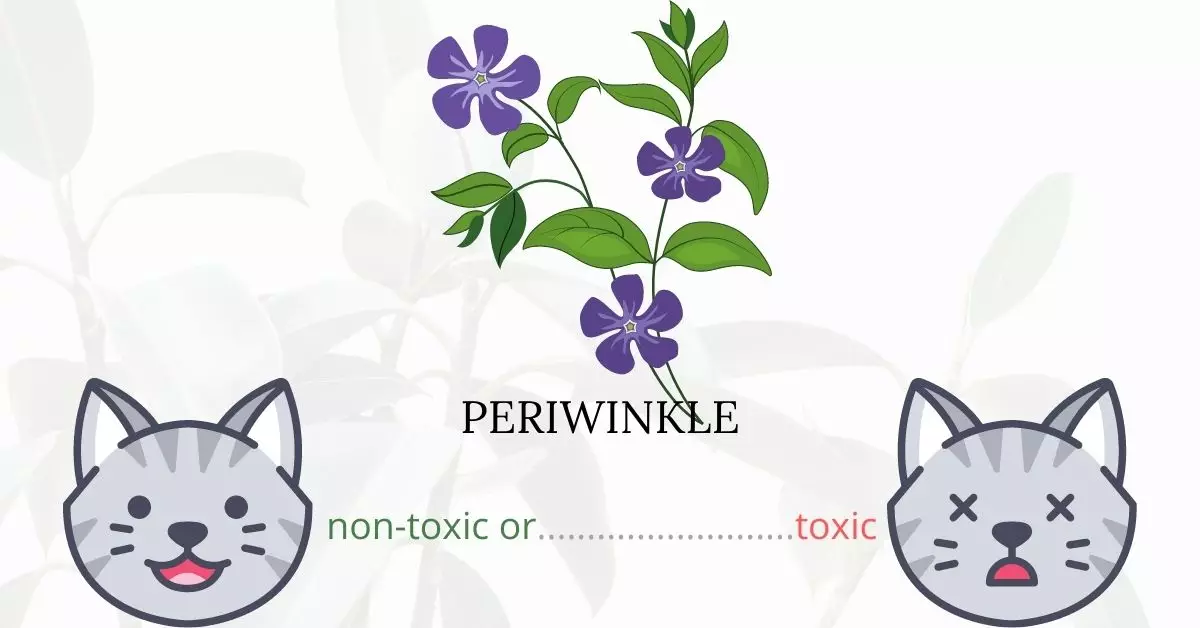Periwinkle, scientifically known as Vinca, indeed poses significant toxicity risks to cats due to the presence of potent alkaloids such as vincristine and vinblastine. These alkaloids, when ingested, can lead to severe health complications, including cell damage, severe blistering, and a decrease in blood pressure, potentially resulting in liver failure in severe instances.
To ensure the accuracy and reliability of this article, we have collaborated with a team of experienced Doctors of Veterinary Medicine (DVMs), who have shared their expert insights on the potential risks associated with periwinkle and its effects on cats. Furthermore, we have meticulously researched high-authority websites such as the ASPCA and PetMD to validate every piece of information pertaining to the plant. Through these concerted efforts, we aim to provide the most accurate and up-to-date information to help cat owners understand the risks and safeguard their pets effectively.
Clinical Signs of Periwinkle Poisoning in Cats
When cats ingest or come in contact with the Periwinkle plant, several clinical signs can emerge due to the toxic alkaloids, vincristine and vinblastine, found in the plant. These signs range from gastrointestinal disturbances to severe neurological issues.
- Vomiting and Diarrhea: These are the most common initial symptoms as the body tries to expel the toxic substances. The gastrointestinal upset is due to the irritation of the stomach and intestines caused by the plant’s toxins.
- Abdominal Pain and Bloating: Ingesting periwinkle can lead to inflammation in the gastrointestinal tract, causing abdominal pain and bloating as the body responds to the harmful alkaloids.
- Constipation: The disruption in the gastrointestinal tract can also lead to constipation due to the altered bowel movements as a reaction to the toxins.
- Depression and Fever: The general toxicity can affect the cat’s overall well-being, leading to behavioral changes such as depression and an elevated body temperature as the body attempts to fight off the toxins.
- Low Blood Pressure and Cardiac Abnormalities: The alkaloids can impact the cardiovascular system, leading to a decrease in blood pressure and abnormalities in heart function, which may be life-threatening if not addressed promptly.
- Problems with the Central Nervous System, Tremors, and Seizures: In severe cases, the toxic impact extends to the central nervous system, causing tremors and seizures due to the disruption in normal neurological function.
- Coma: Extreme cases of periwinkle poisoning can lead to coma as the toxins severely impair brain function, posing a critical risk to the cat’s life.
These symptoms occur due to the body’s response to the cytotoxic and hypoglycemic qualities of periwinkle, which can damage cell activity and lower blood glucose levels respectively. Early recognition of these signs followed by immediate veterinary intervention is crucial to manage the toxic effects effectively and ensure the well-being of the affected cat.
First Aid and Treatment of Periwinkle Poisoning in Cats
The treatment will be based on the symptoms that the cat exhibits. In some cases, treatment may need to commence before a diagnosis has been made.
To remove any remaining plant material, the cat’s oral cavity will be rinsed with water. The veterinarian may choose to make the cat vomit in order to clear the stomach of its contents. If the cat is not stable, gastric lavage, also known as stomach pumping, may be used instead of emesis.
To relieve stomach irritation, some drugs may be prescribed. Both Kapectolin and sucralfate, which coat the stomach and protect it from its contents, can be administered.
Recovery from Periwinkle Poisoning in Cats
Because most cats only consume a small amount, they will recover after the gastrointestinal symptoms have subsided. In the rare occasion that a considerable amount of plant material is ingested, the poisoning might cause lasting liver damage, a compromised immune system, and even death.
Prevention of Periwinkle Poisoning in Cats
Remove any periwinkle plants that are growing in your yards. If this plant is growing in your neighbor’s gardens, it is best to keep your cat indoors for precaution. Staying indoors will minimize the risk of getting in contact with periwinkle or any toxic plants.
If you love plants but have cats at home, check out these lists:





